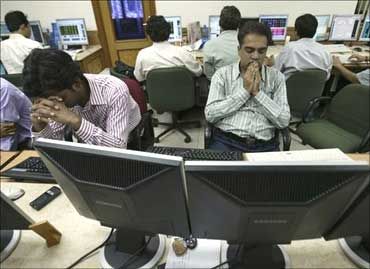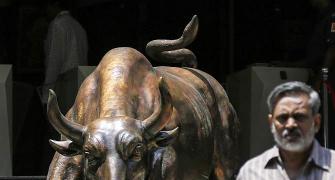 Besides Budget, markets will be driven by global events and the outcome of assembly elections.
Besides Budget, markets will be driven by global events and the outcome of assembly elections.
As the Narendra Modi-led government prepares to present the Budget on February 1 after the big bang demonetisation move in November, the markets have clawed back from their recent December lows with the S&P BSE Sensex rallying nearly six per cent to over 27,200 levels.
The rally in the mid-and small-cap indices has been sharper with the S&P BSE Mid-cap and the S&P BSE Small-cap indices surging around 11 per cent each during this period.
So what does this Budget hold in store, and what are the markets expecting from the finance minister this time around?
The markets, analysts say, are primed with the expectation that the Budget will be focussed primarily on reinforcing the 'black money crackdown' theme with a secondary focus on delivering token payments to the poor as well as income tax cuts.
The government now will have the opportunity to signal its unbridled economic priorities within the broader ambit of prudent fiscal consolidation.
"We expect the government to announce an 'anti-rich' budget which focusses on installing penalties on cash transactions, tax on the withdrawal of cash from the banking system, income tax relief for the middle class and potentially an adverse capital gains tax-related decision for equity investments," says Saurabh Mukherjea, chief executive officer, Ambit Capital.
"Additionally, we expect a moderate increase in revenue expenditure allocation whilst capex is deprioritised. As regards the fiscal deficit, the government is likely to postpone the fiscal goalpost of hitting three per cent of GDP (gross domestic product) in FY18," he adds.
At the turn of the year, the government -- in a mini-Budget of sorts -- had announced measures to boost low-cost housing in the form of interest rate subvention, enhanced credit guarantee and working capital limits for MSME (Micro, Small and Medium Enterprises), proposed interest waiver to farmers for six months and also doled out higher interest rate for senior citizens and cash payment of Rs 6,000 for pregnant ladies.
"The general expectation is that the government will help the sectors that have suffered in the demonetisation process. They may also push policies that will help create jobs, affordable housing and infrastructure, besides taking care of the farmers / agriculture sector. That apart, there are expectations of a cut in tax rates for individuals and corporates. There are chances that the basic exemption limit for individuals will be pushed to Rs 5 lakh and the corporate tax rates will be brought down," says Jigar Shah, chief executive officer, Maybank Kim Eng Securities.
Analysts say the markets will hope for clarity on issues relating to implementation of General Anti-Avoidance Rule (GAAR) and changes, if any, with respect to the taxation norms for investors in capital markets. Though the finance minister has assured a status quo on taxation related issues for investors, any change could dent the overall sentiment.
Market outlook
While most analysts remain optimistic on the road ahead for the equity markets from a long-term perspective, they expect the markets to be driven by more global events such as policy action by global central banks, policies adopted by the US under the new President and developments in the European Union (EU). Back home, outcome of the assembly elections is key for the overall market direction, they suggest.
The markets look fully priced at these levels and there are not many triggers in the short-term. More than the Budget, the markets are eyeing the outcome of the assembly polls, especially in Uttar Pradesh. A victory for the Bharatiya Janata Party will be positive for the markets. A loss, on the other hand, has not been factored in yet," Shah of Maybank Kim Eng Securities adds.
Vikas Khemani, president and chief executive officer, Edelweiss Securities rules out a runaway rally from hereon given the up move seen since the beginning of CY17.
"The markets have done well in January, partly in expectation of the Budget and partly due to the effects of demonetisation fading away. Given that there are still uncertainties and headwinds at the global level, the markets are likely to remain range-bound and consolidate rather than seeing a runaway rally from the current levels.
"The Nifty50 index could remain in a range of 8,200-8,800 levels over the next few months," Khemani says.










